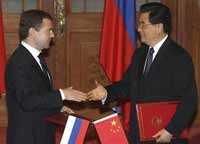China and Russia show tougher criticism of USA
Leaders of China and Russia continue to keep their opposition to USA's plans to create the missile shield.

Moscow and Beijing have forged close political and military ties after the Soviet collapse to counter the perceived U.S. domination in global affairs. While they have spoken against the U.S. missile defense plans in the past, Friday's declaration by Medvedev and Chinese President Hu Jintao sounded tougher than earlier criticism.
Without naming the United States, the two leaders said that "the creation of global missile defense systems and their deployment in some regions of the world ... does not help to maintain strategic balance and stability and hamper international efforts in arms control and nuclear nonproliferation."
Aside from the tougher talk on U.S. missile defense, the two governments also raised their already robust cooperation on energy, signing a US$1 billion (EUR 670 million) nuclear cooperation deal. The agreement calls for Russia to build a US$500 million (EUR 335 million) nuclear fuel enrichment plant and supply semi-enriched uranium worth at least US$500 million (EUR 335 million).
Russia is looking to China as an important market for civilian nuclear technology as Beijing builds more nuclear power plants in an effort to curb rapid growth in use of fossil fuels.
Hu began the talks by expressing gratitude to both Medvedev and his predecessor Vladimir Putin - now prime minister - for assistance offered after the May 12 quake that killed more than 55,000 people.
Russia sent rescue crews and a mobile hospital to the disaster area in central Sichuan province.
"By visiting China on his first trip abroad since taking office, President Medvedev has shown that he attaches a high level of importance to the development of bilateral ties," Hu said. "I am sure this visit will give impetus to our strategic partnership and take it to a new level."
Medvedev offered his condolences to quake victims and said Moscow would provide any assistance needed.
"Russia and China are strategic partners. You have rightly pointed out the meaning of my first foreign trip in my capacity," he said. "It is very important that there are no pauses in our relationship."
Medvedev came to China from a stop in neighboring Kazakhstan, where he was seeking to preserve his country's clout in energy-rich central Asia and send a message to both Beijing and the West that Moscow continues to see the region as its home turf.
China already has won a cut of the region's riches, reaching an oil pipeline deal with Kazakhstan and negotiating a gas agreement with Turkmenistan.
There is also rich symbolism in Medvedev's choice of China as the main destination of his first foreign trip. When his predecessor Putin went abroad for the first time as president in 2000, he traveled to London - via Belarus - with a message Russia wanted closer ties to the West.
In recent years, China and Russia have made highly symbolic political overtures to one another, holding joint military maneuvers and engaging in high-level talks on creating a "multi-polar world."
Putin greatly strengthened relations with China, reaching a long-delayed agreement on demarcation of the 2,700 mile (4,300-kilometer) border.
However, economic ties have lagged. Bilateral trade rose by about one-third last year to some US$48 billion (EUR 31 billion), but still accounts for only 2 percent of China's global trade. China does more than eight times as much business with the United States.
Subscribe to Pravda.Ru Telegram channel, Facebook, RSS!


